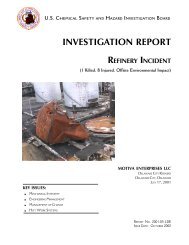Little General Store Propane Explosion - US Chemical Safety and ...
Little General Store Propane Explosion - US Chemical Safety and ...
Little General Store Propane Explosion - US Chemical Safety and ...
Create successful ePaper yourself
Turn your PDF publications into a flip-book with our unique Google optimized e-Paper software.
<strong>Little</strong> <strong>General</strong> <strong>Store</strong> September 2008<br />
The CSB found a number of other incidents in which propane service technicians assisted first responders<br />
in emergencies involving their companies’ equipment <strong>and</strong> product. First responders consider propane<br />
service technicians to be “product <strong>and</strong> container specialists” who have more experience dealing with<br />
propane <strong>and</strong> its systems than firefighters, police, paramedics, <strong>and</strong> EMTs. 42 Although propane service<br />
technicians are not trained to take action to mitigate a hazardous materials emergency without specific<br />
training, 43 emergency responders often seek their advice <strong>and</strong> assistance.<br />
PERC <strong>and</strong> the NPGA provide a <strong>Propane</strong> Emergencies training curriculum for first responders that<br />
addresses the role of propane service technicians in the incident comm<strong>and</strong> structure (see Section 5.3).<br />
However, CETP only briefly addresses emergencies at bulk plants <strong>and</strong> traffic accidents involving delivery<br />
vehicles. No CETP module specifically addresses the potential emergencies service technicians<br />
encounter or the basics of hazardous materials incident response.<br />
5.3.2 Thompson Gas/Appalachian Heating Employee Training<br />
Thompson Gas <strong>Propane</strong> Partners, LLC required all propane service technicians to be CETP-trained to the<br />
appropriate level for their jobs. The 2005 contract with Appalachian Heating defines responsibilities,<br />
including employee training: Appalachian is responsible for ensuring that all employees working with<br />
propane are qualified “as defined in NFPA 54 <strong>and</strong> 58” <strong>and</strong> CETP-trained for their particular jobs. The<br />
specific requirements include completion of CETP 1.0, Basic Principles <strong>and</strong> Practices, within 30 calendar<br />
days of first working for Appalachian/Thompson, <strong>and</strong> completion of other applicable modules within one<br />
year. Additionally, Appalachian Heating must maintain all training records <strong>and</strong> certifications, provide<br />
ongoing training, <strong>and</strong> update the staff list for Thompson Gas before any new employees begin working.<br />
42 <strong>Propane</strong> Emergencies, PERC <strong>and</strong> NPGA, 3 rd edition, page 44.<br />
43 HAZWOPER St<strong>and</strong>ard, 29 CFR 1910.120(q).<br />
40









